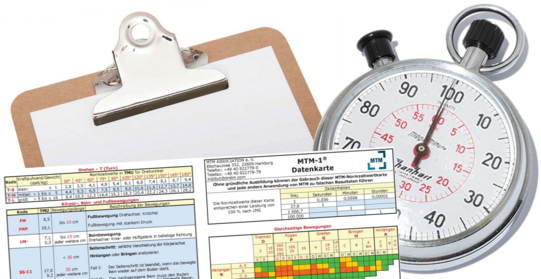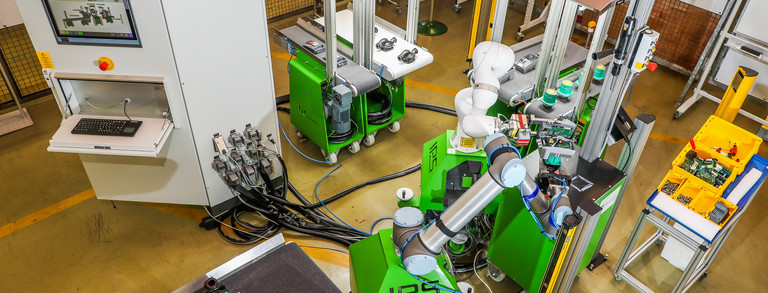The role of time management at the IPS
Since its foundation as a chair for work and production systems, the Institute of Production Systems has been concerned with the future-oriented development of the role of industrial engineering. The new process building block system MTM-HWD forms the basis for innovative research approaches.

Innovation needs origins
The historical orientation of the institute, with its clear focus on work and production system design, has evolved over time to include the additional specialist areas of Smart Quality and Digital Manufacturing. This ensures an interdisciplinary approach to both research questions and industrial use cases. As one of the core elements of work system design, the institute's work in the area of time management and ergonomics stands as an example of this. In cooperation with REFA and MTM as the major associations in the field of work system design in Germany and worldwide, the topics of time management and ergonomics are dealt with in a triad of research, industry and teaching.
Due to the high level of competence of the employees, who are trained up to the level of instructors, especially complex industrial projects are successfully completed. The accepted order spectrum ranges from the execution of rudimentary time studies to the introduction or optimization of entire time management concepts in companies. The institute's close ties to both employers' and employees' associations, which are expressed in particular in contract research in addition to the area of training, ensure a holistic view of problems and a high level of acceptance.
MTM-HWD as a motor for innovation in industrial engineering
In addition, the interdisciplinary orientation of the IPS offers great potential for research projects in the field of time management and ergonomics. The simplification, streamlining and linking of time management systems as well as ergonomics evaluation are at the center of SME-focused research at the IPS. MTM-HWD represents a special potential for this from the institute's point of view.
As a holistic process building block system, MTM-HWD enables the simultaneous evaluation of ergonomic risks and basic times based on a process description. This significantly reduces the evaluation effort and avoids different planning statuses as a reference for assessment. By qualifying employees at the IPS in the new system up to the level of instructor, as well as by focusing research in the area of time management and ergonomics on MTM-HWD, its dissemination is promoted and its further development is advanced. One example for this is the institute’s participation in the German MTM-HWD user group as the sole research center. The user group pursues the goal of optimizing and further developing the new MTM-HWD process language and also provides the IPS with an ideal platform for identifying research topics of practical relevance.
Competence transfer in time management
In addition to the basics in the area of work system design, the new developments in the area of time management and ergonomics in particular are transferred into the institute's teaching. The transformation of classical time management into a holistic tool for modern industrial engineering is the focus of various courses, but especially in the module Methods of Time Management. By imparting knowledge in current process building block systems, the connection of ergonomics and time management as well as the integration of time management data into the product development process, the industrial engineers of the future are equipped with a comprehensive toolkit for practice. In addition, the fundamental knowledge is imparted in training courses on the MTM-1 and MTM-UAS systems in cooperation with the research partner RIF e.V..
Through the transfer of competencies including the dissemination of future-oriented methods, participation in the further development of existing building block systems, the development of SME-capable approaches for holistic and simple industrial engineering as well as the integration of interdisciplinary approaches in research questions, the focal points of teaching, research and industrial application at the IPS successfully go hand in hand. They enable the IPS to disseminate, design and further develop modern methods of work system design.


